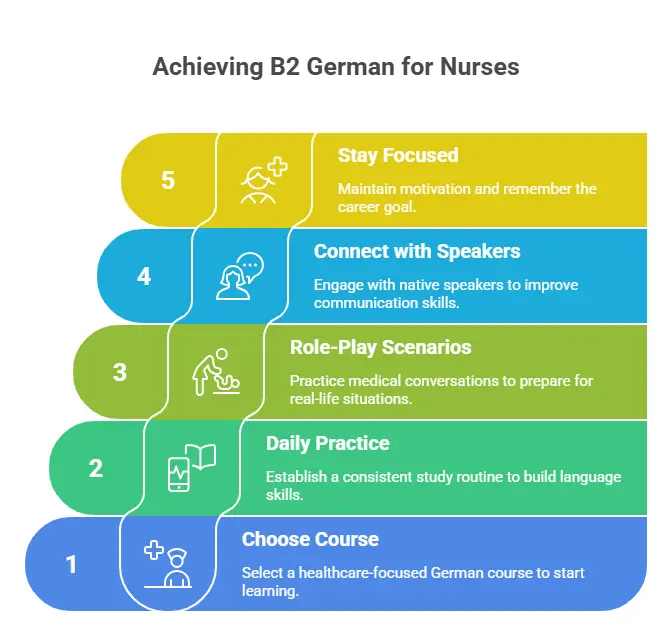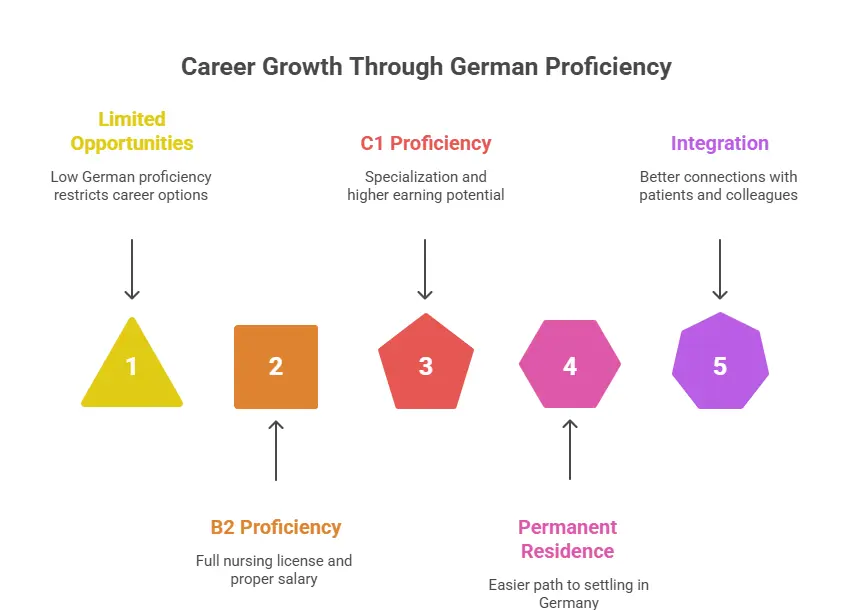Table of Contents
Germany is facing a growing shortage of nurses, and with an aging population, the demand for skilled healthcare workers has never been higher. For international nurses, it creates a great opportunity to create a stable and rewarding career in one of Europe’s strongest health systems. But to succeed, it is just as important to speak German as medical knowledge – because the language is the bridge that connects you to patients, colleagues and everyday life.
Your German language level just does not decide that you can land a job – it also shapes how much you earn, how easily you integrate into the hospital team, and how you take care of patients. Going from A1 to B2 German can actually be a difference between basic communication and can rely on complex responsibilities. Simply put: the better your German, the better your career prospects in nursing.
Ready to take your German skills to the next level? Get Free Demo Classes Here!
Why German Language Skills Are Mandatory for Nurses?
For nurses in Germany, it is not just a useful skill to speak German – it is necessary. Good communication is in the heart of every healthcare system, and without it, the patient’s safety and quality care can be at risk. Here’s why language skills depend on so much:
1. Patient Safety Comes First
Nurses spend most time with patients, listening to their concerns, monitoring their symptoms and explaining the treatment. If a nurse struggles with the German language, the important details may be misunderstood. Even a small incorrect communication can affect the patient’s health. The clear language helps nurses to understand the instructions properly and take necessary actions for patient safety and care.
2. Working with Doctors and Teams
Each nurse should coordinate with doctors, physiotherapists and other health professionals every day. From discussing the test results to updating each patient’s condition, accurate communication ensures that everyone is on the same page. Speaking German fluently makes teamwork smooth and reduces mistakes.
3. Handling Paperwork and Documentation
In Germany, nurses are also responsible for keeping detailed medical records. This includes writing progress notes, filling in charts and filling out official forms. These documents are legal records, and they should be accurate. Without the right German skills, paperwork can be stressful, and errors may easily occur during documentation.
4. A Legal Requirement
The German nursing council and hospitals require a certain level of German (usually B2 level), before you can officially work as a registered nurse. This ensures that each nurse can effectively communicate and fulfill the country’s healthcare standards. Without right proof of language skills, it is not possible to get a license for start practicing.
Step-by-Step Guide: German Language Levels (A1→B2)
1: How do you say "Good Morning" in German?
Learning German for nursing in Germany is a journey, and each level builds the foundation for the next. To work as a nurse, you need to reach B2 level German, but understanding what each stage means will help you set clear goals along the way.
| Level | What You Can Do | Nursing Role/ Limitations |
|---|---|---|
| A1 | Basic greetings, introduce yourself, ask simple questions, handle daily life tasks (shopping, transport). | Not enough for nursing. Only useful for adjusting to life in Germany. |
| A2 | Simple conversations, small talk with patients, understand short and familiar phrases. | Can make patients feel comfortable, but not ready for medical work or official duties. |
| B1 | Understand workplace instructions, talk about health topics, manage simple medical conversations. | Good for training, internships, or assistant roles. Still not sufficient for full license. |
| B2 | Full communication with doctors, patients, and colleagues. Can write documentation, handle emergencies, and use medical terminology. | Required for professional nursing license (recognition process). Officially allows you to work as a registered nurse. |
A1: The Starting Point
At the A1 level, you learn the basics—introducing yourself, greeting people, asking for directions, or ordering food. This is enough to get by in daily life, like shopping or saying “hello” to patients. However, it’s far from enough for nursing. You can’t yet handle medical terms or follow workplace instructions. Think of A1 as your first step into German life, not into German healthcare.
A2: Everyday Conversations
At A2, you start to understand and use more phrases. You can make small talk with patients about how they’re feeling or talk about your family and hobbies. This level allows you to build a friendly connection, but when it comes to hospital tasks or paperwork, it’s still not sufficient. You may understand some instructions, but not in enough detail to provide safe patient care.
B1: The Workplace Foundation
Reaching B1 is a big step forward. Right now, you can follow basic workplace instructions, talk about health topics in simple terms, and hold straightforward medical conversations. For example, you can explain a patient’s diet plan or ask about their pain level. Many nurses at B1 can start training positions or internships in Germany. Still, this level is not enough for a full nursing license, because complex discussions, emergencies, and medical documentation require more advanced German.
B2: The Professional Standard
B2 is the level you need to officially work as a registered nurse in Germany. With B2 level German language, you can confidentlty communicate with doctors, colleagues, and patients, even in stressful situations like emergencies. You will be able to write accurate documentation, understand medical reports, and follow legal requirements in nursing. Hospitals and nursing councils require B2 level German language skill because it proves you can handle the professional responsibilities safely and confidently.
Ready to take your German skills to the next level? Get Free Demo Classes Here!
Free German A1 Mock Tests – Powered by AI!
Test your skills on our interactive platform. Get instant feedback from our AI to help you communicate better and track your progress. Start your free German mock test now.
Test Your German A1 for FreeB2 German Exam for Nurses (What to Expect)
To work as a registered nurse in Germany, you must prove your language skills with a recognized B2 exam. The most common exams are TELC B2 Pflege (focused on nursing) and the Goethe B2 exam (general German). Both are designed to check if you can effectively communicate in real healthcare conditions. The exam usually consists of four sections: speaking, listening, reading, and writing.
1. Speaking
In the speaking part, you can play a role with patients, family members or colleagues. For example, you may be asked to explain how to take the medicine, calm a concerned patient or discuss the treatment plan with the doctor. The goal is to show that you can use German language clearly, politely, and professionally.
2. Listening
Here you will hear the conversation between doctors and nurses, or announcements in a hospital. Then you will answer questions to show you understood the main points. It tests your ability to get important details, even in a busy healthcare system where communication must be quick and accurate.
3. Reading
In this section you will read medical texts, instructions in the workplace or the patient’s guidelines. You must show that you can understand the written German to more detailed medical documents. This is important because nurses often work with charts, guidelines and official comments.
4. Writing
Finally, you will write small texts such as reports, documentation or a patient handover note. For example, you may be asked to describe the condition of a patient for the next nurse on the shift. Accuracy and clarity are important here, as written communication is a legal part of nursing in Germany.
To pass the B2 level exam shows that you can only do more than “speak German” – it proves that you can handle the real responsibility for nursing at the German hospital or the care home. Although the exam can feel challenging, it is designed to prepare you for success in your career and to ensure that patients get safe, high quality-care.
|
German A2 Exercises – Download Free PDF |
||
Pathway to B2 German for Nurses
Reaching B2 level German can seem challenging, but with the right plan and stability it is certainly possible. Most nurses regularly require about 8 to 12 months of regular study to go from the beginner level to B2 level, it depends on how much time they can dedicate each week.
Step 1: Choose the Right Course
There are many ways to learn German, but nurses benefit from programs designed for healthcare services. You can join the German language course for nurses abroad, enroll in online platforms with medical German lessons, or even participate in hospital sponsered language programs after you reached in Germany. These options combine everyday German language with the medical terminology you need.
Step 2: Build Daily Practice Habits
Consistency is more important than speed. Even just 1 to 2 hours a day adds study quickly. Mix different teaching styles – vocabulary, grammar exercise, listening German podcast or watching medical videos in German. The more you highlight yourself in the language, the faster you will move on.
Step 3: Practice Real-Life Nursing Scenarios
Language is about communication, not just about theory. Try role playing medical conversations such as explaining medicine to a patient or reporting symptoms to a doctor. This helps you feel confident in real hospital situations. Many language schools include these role-plays in their training because they prepare you for both the B2 exam and daily work.
Step 4: Connect With German Speakers
It is important to learn in the classroom, but talking in real life makes a difference. Join German-speaking groups online, find a language partner or participate in social programs. Talking with native speakers helps you listen and practice naturally, which is necessary for you to take care of the patient.
Step 5: Stay Focused on the Goal
Remember that B2 level is not just about passing an exam – this is the key to starting your nursing career in Germany. Every new phrase you learn and analyze brings you closer to communicating with patients, building trust with colleagues, and working confidently in a hospital.
Extra Requirements Beyond B2
Reaching B2 German is the minimum requirement to work as a registered nurse in Germany, but in some cases, you may need to go even further.
1. Higher Levels for Specialization
While B2 is enough for general nursing practice, some German states or hospital may request C1-level medical German, especially if you are planning to specialize or work in advanced roles. In C1 level, your language skills should more accurate – that you can understand complex medical texts, handle detailed discussion with doctors and handle important issues with confidential. This high level ensures that special nurses can meet the requirements for more complex medical treatment.
2. Continuous Learning After Arrival
Language learning is much important after passing the nursing license exam also. Even nurses who receive B2 or C1 level often attend courses or any workshops in Germany. This ongoing practice helps them to be familiar with medical terminology, strengthen professional communication and adjust their local accents. Regular interactions with patients and colleagues in hospital also provide a natural way to advance their German language skills.
Why It Matters
The healthcare system is constantly evolving and so is the language used in hospitals. Continuing to develop your German, not only makes your work easier, but also increases the chances of career development. Better language skills can open doors for leadership roles, advanced nursing positions or even future opportunities for teaching and training.
Free German A1 Mock Tests – Powered by AI!
Test your skills on our interactive platform. Get instant feedback from our AI to help you communicate better and track your progress. Start your free German mock test now.
Test Your German A1 for FreeHow Language Level Affects Career Growth in Germany
For international nurses, German learning is not just about passing an exam – it directly forms your career, salary expectations and life in Germany. The higher the level of your language, the more opportunities open for you in both work and personal life.
1. Higher Salary Opportunities
Hospital and care facilities emphasize nurses who can clearly communicate with patients and medical teams. At lower levels, such as A2 or B1 level, you can only qualify for assistant roles or training positions with limited pay. But when you reach B2 level, you can get a full nursing license, which comes with the salary of a proper nurse. Nurses who continue at C1 level or specialize in some areas often receive better salaries as they are cleared with more responsibility.
2. Easier Path to get Permanent Residence
Germany welcomes skilled health professionals, but the language plays a major role in long-term success If you want to apply for a permanent residence or even citizenship, the proof of your German language skills is necessary. The higher your level of language, the easier the process will be. For example, if you having B1 or higher German language level is often a minimum requirement for residence applications, and showing B2 or C1 level can make the process easier. Good language skills also help you deal with daily tasks such as banking, housing or government paperwork – making life very easy without work.
3. Better Integration With Patients and Colleagues
Nursing is about building trust. Patients feel safe when they can share concerns or pain in their own language and know that you understand them. Clear communication also makes teamwork easier, especially during busy rounds. With B2 and higher you can follow the instructions and get in touch with colleagues. It makes you feel more involved at work and in the community.
4. Long-Term Career Growth
Good German skills are also gateway to the development of careers. The nurses who continue to learn often go to special roles, leadership positions or even educational and training jobs. Language is not just about passing the exam – this is an investment that holds opening doors throughout your career in Germany.
|
Goethe 2025 Exam Dates: Multiple Test Centers |
|
| Trivandrum Goethe Exam Dates | Kochi Goethe Exam Dates |
| Chennai Goethe Exam Dates | Coimbatore Goethe Exam Dates |
Conclusion
To build a successful nursing career in Germany, learning language is important as medical training. While A1 and A2 level help you in daily life, and B1level language prepares you for training or internship, you need at least B2 level German language to get your professional nursing license. This B2 level allows you to communicate with patients, doctors and colleagues, handle emergency situations and complete entire medical paperwork with confidence.
Ready to take your German skills to the next level? Get Free Demo Classes Here!
If you are wishig to work as a nurse in Germany, the best time to start learning German language is today itself. The journey takes more effort, but each step brings you closer to reach your goal. With frequent studies, practice and proper support, you can reach B2 level German language within 8 to12 months and open the door to a well built and rewarding career in Germany.
Free German A1 Mock Tests – Powered by AI!
Test your skills on our interactive platform. Get instant feedback from our AI to help you communicate better and track your progress. Start your free German mock test now.
Test Your German A1 for FreeFrequently Asked Questions
Do I need B2 German to start working in Germany as a nurse?
Yes. To get your professional nursing license in Germany, you need at least B2 level German. This ensures you can communicate clearly with patients, doctors, and colleagues, and handle documentation and emergencies safely. Without B2, you can’t be recognized as a registered nurse, though some hospitals may offer assistant roles if you’re at B1.
Can I go to Germany with A1 German and study there?
Yes, it’s possible. Many international nurses move to Germany with A1 or A2 German and continue their studies in the country. Some employers or agencies provide hospital-sponsored language courses. However, you cannot practice as a registered nurse until you reach B2. Starting your learning early at home will give you a big advantage.
Is TELC B2 Pflege compulsory?
Not always. TELC B2 Pflege is widely accepted because it focuses on medical German, but exams like the Goethe B2 or ÖSD are also valid in many German states. The key requirement is having a recognized B2 German certificate. Which exam you take depends on the state and hospital where you apply.
How long does it take to learn German for nurses?
Most nurses need about 8–12 months of consistent study to reach B2. Intensive courses can speed up the process, while part-time study may take longer. Regular practice—especially role-playing medical conversations and speaking with native Germans—makes a big difference in how quickly you progress.
Do some states require C1 German for nurses?
Yes, in certain cases. While B2 is enough for general nursing, some German states or hospitals ask for C1 medical German, especially if you want to specialize or take on advanced roles. C1 allows you to understand complex medical texts, handle detailed discussions, and work with high precision.
Does language level affect salary for nurses in Germany?
Absolutely. Nurses with only A2 or B1 usually work in assistant roles with lower pay. Once you achieve B2, you qualify for a full nursing license and earn the standard nurse’s salary. If you reach C1 or move into specialized fields, your salary potential increases further because you can take on more responsibilities.














